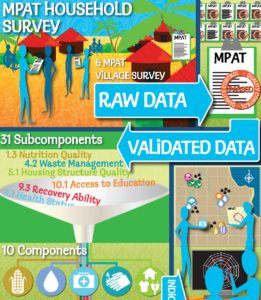The Multidimensional Poverty Assessment Tool: Brochure (& Infographics)
 Abstract/Summary: The Multidimensional Poverty Assessment Tool (MPAT) provides data that can inform all levels of decision making by providing a clearer understanding of rural poverty at the household and village level. As a result, MPAT can significantly strengthen the planning, design, monitoring and evaluation of a project, and thereby contribute to rural poverty reduction.
Abstract/Summary: The Multidimensional Poverty Assessment Tool (MPAT) provides data that can inform all levels of decision making by providing a clearer understanding of rural poverty at the household and village level. As a result, MPAT can significantly strengthen the planning, design, monitoring and evaluation of a project, and thereby contribute to rural poverty reduction.
This brochure explains:
-
- What MPAT is
- How MPAT works
- When to use MPAT and why
- How to use MPAT
- What resources are available for implementing MPAT
The tool allows project managers, government officials, researchers and others to identify and monitor sectors that require support in order to reduce rural poverty and improve livelihoods. It also provides an objective means of justifying resource allocation or planning priorities. MPAT is based on a bottom-up, participatory approach that reflects communities’ voices, wants and perspectives.
The Multidimensional Poverty Assessment Tool: Brochure (& Infographics)
Authors: IFAD [Cohen, A.]
Publication Year: 2014 | Journal / Publisher: United Nations International Fund for Agricultural Development
 Abstract/Summary: The Multidimensional Poverty Assessment Tool (MPAT) provides data that can inform all levels of decision making by providing a clearer understanding of rural poverty at the household and village level. As a result, MPAT can significantly strengthen the planning, design, monitoring and evaluation of a project, and thereby contribute to rural poverty reduction.
Abstract/Summary: The Multidimensional Poverty Assessment Tool (MPAT) provides data that can inform all levels of decision making by providing a clearer understanding of rural poverty at the household and village level. As a result, MPAT can significantly strengthen the planning, design, monitoring and evaluation of a project, and thereby contribute to rural poverty reduction.
This brochure explains:
-
- What MPAT is
- How MPAT works
- When to use MPAT and why
- How to use MPAT
- What resources are available for implementing MPAT
The tool allows project managers, government officials, researchers and others to identify and monitor sectors that require support in order to reduce rural poverty and improve livelihoods. It also provides an objective means of justifying resource allocation or planning priorities. MPAT is based on a bottom-up, participatory approach that reflects communities’ voices, wants and perspectives.
PDF on Publisher Website | PDF on OSF
